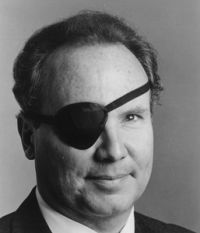
Lowell H. Lebermann, Jr.
Appointed by
Term
Occupation
Date of Passing
U.T. Austin
LOWELL H. LEBERMANN, JR. of Austin was appointed to a six year term on the Board of Regents of The University of Texas System by Governor Ann Richards in 1993 and served as a Vice- Chairman of the Board from March 1993 to March 1995. He continues to serve as chairman of the U. T. System Process Review Committee with a mandate to recommend procedures and methodologies by which the governance and management of the System may be made more effective and efficient.
Since 1981, Mr. Lebermann has been president and owner of Centex Beverage Inc. of Austin, a wholesale beer distributor. He previously owned the Lebermann Lincoln-Mercury dealership in Austin. He has been a member of the board of directors of Valero Energy Corp. and First City National Bank of Austin, and he has served as Vice president for development of the Austin Chamber of Commerce.
Mr. Lebermann was a member of the Austin City Council from 1971 to 1977. He also served as treasurer of the Democratic Party of the State of Texas in 1981. From 1991 to 1993, he was a member of the board of directors of the Texas Workers' Compensation Insurance Fund.
His many community and civic activities include membership on the Development Board of The University of Texas at Austin, The Chancellor's Council of the U.T. System, the Symposium Planning Committee of the LBJ School of Public Affairs, and the board of trustees of the National Wildflower Research Center. He also has served as vice president of the U.T. Austin Ex-Students' Association and is a member of the Longhorn Foundation.
Mr. Lebermann is a past president of the Capitol Area Council of the Boy Scouts of America and has been an active supporter of the Austin Symphony, the Paramount Theatre of Austin, Laguna Gloria Art Museum, the Sundance Institute, and the Texas Nature Conservancy.
Numerous organizations have honored Mr. Lebermann ,for his contributions to society. He is a recipient of the Pro Bene Meritis Award of the U.T. Austin College of Liberal Arts, the Brotherhood Award of the National Conference of Christians and Jews, the State Liberty Bell Award of the Young Lawyers Association of Texas, and the "People of Vision" award of the Texas Society to Prevent Blindness.
Mr. Lebermann attended U.T. Austin from 1957 to 1962. He was a student in the Plan II honors program, and he was elected president of the Students' Association for 1962.
last updated in March 1995

